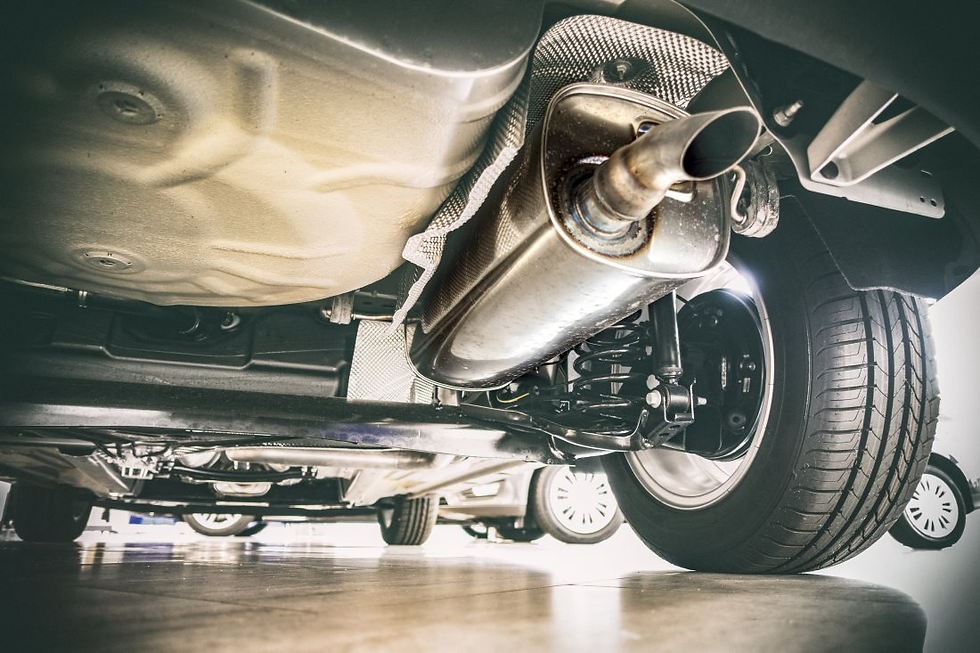Care and Function of a Car’s Exhaust System
- Quality Auto & Body

- 29 ago 2024
- 5 Min. de lectura
The exhaust system of a car is a critical component that, although often overlooked, plays a crucial role in the vehicle's performance, efficiency, and safety. Understanding how the exhaust system works, its importance, and how to care for it properly can extend the life of your car and improve its performance on the road.
In this article, we'll dive into the workings of the exhaust system, its components, the significance of its maintenance, and how to care for it to ensure a safer, more efficient, and environmentally friendly vehicle.
1. What is the Exhaust System?
The exhaust system of a car is a series of components designed to expel the gases resulting from combustion in the engine. These gases, which include carbon monoxide, carbon dioxide, nitrogen oxides, and particulates, are potentially harmful to both human health and the environment. The exhaust system helps channel these gases from the engine to the outside of the vehicle, filtering them and reducing their environmental impact.
2. Main Components of the Exhaust System
The exhaust system consists of several elements, each with a specific function:
Exhaust Manifold: Collects the exhaust gases from the engine's cylinders and directs them to the rest of the system.
Catalytic Converter: This component is crucial for reducing harmful emissions by transforming toxic gases into less harmful substances before they are released into the atmosphere.
Muffler: Reduces the noise produced by the exhaust gases as they pass through the system.
Exhaust Pipe: Channels the gases outside the vehicle, away from the engine and cabin.
3. How the Exhaust System Works
The exhaust system begins with the exhaust manifold, which is directly connected to the engine's cylinders. When combustion gases exit the cylinders, the manifold collects them and channels them toward the catalytic converter. The catalytic converter uses a series of chemical reactions to convert harmful gases into less harmful compounds, such as carbon dioxide and water vapor.
After passing through the catalytic converter, the gases move towards the muffler. The primary purpose here is to reduce noise. The muffler contains a series of chambers and tubes that help dissipate sound waves and lower the noise level of the exhaust. Finally, the gases are expelled through the exhaust pipe, which directs them out of the vehicle.
4. Importance of the Exhaust System
The exhaust system is not only important for reducing harmful emissions and decreasing noise, but it also plays a fundamental role in engine performance. A well-maintained exhaust system allows the engine to operate more efficiently by facilitating the expulsion of combustion gases and preventing pressure buildup in the engine.
Moreover, a well-functioning exhaust system is essential for the safety of the driver and passengers. Leaks in the exhaust system can allow dangerous gases, such as carbon monoxide, to enter the vehicle cabin, posing a serious health risk.
5. How to Care for the Exhaust System
Caring for the exhaust system involves several practices that can prolong its lifespan and ensure optimal functioning. Here are some key tips for exhaust maintenance:
5.1 Regular Inspections
It is important to conduct regular inspections of the exhaust system to identify potential problems before they become serious failures. During an inspection, check the exhaust manifold, catalytic converter, muffler, and exhaust pipe for signs of damage, corrosion, or leaks.
5.2 Maintenance of the Catalytic Converter
The catalytic converter is one of the most expensive components of the exhaust system, so keeping it in good condition is crucial. Avoid using low-quality fuels and keep the engine properly tuned to prolong the catalytic converter’s lifespan. Additionally, avoid overheating the engine, as this can damage the converter.

5.3 Avoid Moisture Buildup
Water is one of the biggest enemies of the exhaust system. Over time, moisture can cause corrosion in the exhaust components, especially if the vehicle is used infrequently. To minimize the risk of corrosion, drive the vehicle long enough for the exhaust system to reach a temperature that evaporates any accumulated moisture.
5.4 Drive Carefully on Rough Roads
The exhaust system is located under the vehicle, making it vulnerable to damage from impacts or hits while driving on rough roads or over objects on the road. Driving carefully and avoiding potholes can help protect the exhaust system from physical damage.
5.5 Timely Repairs
If any problems are detected in the exhaust system, it is important to make repairs as soon as possible. Ignoring signs of damage, such as unusual noises or smoke, can lead to more severe and costly damage. Replacing damaged parts in time can prevent major issues in the future.
5.6 Cleaning and Corrosion Protection
Keeping the exhaust system clean can help identify problems and prevent corrosion. There are specific products available for cleaning and protecting exhaust components, which can be applied during regular inspections.
6. Signs of Exhaust System Problems
Recognizing the signs of exhaust system problems is essential to prevent serious failures. Some of the most common signs include:
Excessive Noise: If the exhaust is louder than usual, it could be a sign that the muffler is damaged or there is a leak in the system.
Gas Smell in the Cabin: An unusual smell inside the vehicle could indicate that there is a leak in the exhaust system, which can be dangerous.
Reduced Engine Performance: A blocked or damaged exhaust can affect engine performance, causing a decrease in power and fuel efficiency.
Visible Smoke: The presence of black or blue smoke in the exhaust can indicate problems with engine combustion or the catalytic converter.
7. Common Myths About the Exhaust System
There are several myths about the exhaust system that can lead to poor maintenance or incorrect decisions. Here are some of the most common myths debunked:
"A noisy exhaust is just a sound problem": A noisy exhaust is not just an auditory nuisance; it could be a sign of a more serious issue in the system, such as a leak that could affect engine performance.
"It doesn't matter if the exhaust pipe is rusty": Corrosion on the exhaust pipe can weaken its structure and cause leaks, which are potentially dangerous.
"Smoke is normal in cold weather": While it is common to see water vapor in cold weather, constant smoke, especially if it is black or blue, indicates a problem that should be investigated.
8. Benefits of a Well-Maintained Exhaust System
Maintaining the exhaust system in good condition is not only important for vehicle safety and performance but also has several additional benefits:
Better Engine Performance: An efficient exhaust system facilitates the expulsion of combustion gases, allowing the engine to operate more efficiently.
Improved Fuel Efficiency: A clear and well-maintained exhaust system helps improve fuel efficiency, saving money in the long run.
Reduction of Harmful Emissions: A well-maintained exhaust system, especially the catalytic converter, is essential to minimize the environmental impact of the vehicle.
Extended Vehicle Lifespan: Taking care of the exhaust system can help prevent damage to other engine parts, which in turn can extend the overall lifespan of the vehicle.
9. When to Replace the Exhaust System
Although regular maintenance can prolong the lifespan of the exhaust system, there will eventually come a time when some components need to be replaced. Some signs that it’s time to replace parts of the exhaust system include:
Severe Corrosion: If corrosion has significantly weakened the exhaust pipe or muffler, it is likely that these components need to be replaced.
Persistent Leaks: If repairs cannot stop leaks in the exhaust system, the affected part may need to be replaced.
Catalytic Converter Failure: If the catalytic converter fails, it should be replaced immediately to avoid problems with emissions and engine performance.
10. Conclusion
The exhaust system is a fundamental part of the car that affects not only performance and efficiency but also environmental impact and driver safety. Regular maintenance, timely repairs, and understanding how the system works are key to ensuring the long-term health of your vehicle.
By following the maintenance tips and understanding the importance of each component, you can keep your exhaust system in top condition, benefiting both your vehicle and the environment













Comentarios